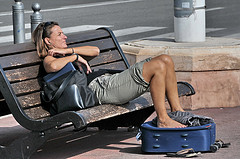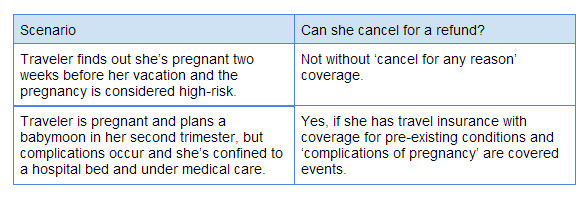 Many travelers are willing to fly as long as five or six hours to a destination they’ve always wanted to see as long as they can spend at least three or four nights there. Travel dreamers often find themselves spending time online watching for airfare sales – and when they find one, they’ll snatch it up quickly.
Many travelers are willing to fly as long as five or six hours to a destination they’ve always wanted to see as long as they can spend at least three or four nights there. Travel dreamers often find themselves spending time online watching for airfare sales – and when they find one, they’ll snatch it up quickly.
Before you book that short getaway, however, make sure that your destination doesn’t take multiple forms of transportation to reach – such as islands that are only finally accessible by infrequent ferries or resorts that have a private shuttle from the airport (especially one that waits until a minimum number of guests have arrived and the van is considered ‘full’).
Of all the mistakes short-trip travelers make, however, the biggest is treating their short getaway like it’s a longer trip. It’s easy to do. Nearly all the expert travel advice is geared toward longer trips, but that advice can actually make a mess out of a short trip.
Here are some important tips to make the most of short getaways.
1. Carry your bags – don’t check them
Nothing would make your short getaway more frustrating than arriving at the airport and finding your bag was misrouted and won’t be here for days. With all the great packing advice, there’s really no reason to check a suitcase for a short trip:
Packing Smart: Best Tips from Travel Experts
7 Tips to Lighten your Load on your Next Trip
Plus, checking a bag usually requires getting to the airport even earlier and paying a little more money, which cuts into your time and cash for seeing the sights.
2. Book the hotel close to what you want to see
When you have more time to spend, booking a hotel some distance away from the action is often recommended for cost-saving reasons. When you’re on a short getaway, however, it takes time to get to and from your hotel, and it’s likely you’ll pay more for transportation too, so it’s not the best decision on a short trip.
Book your hotel close to the sites you want to see and you might spend a little more per night, but you may end up recouping that money by paying less in transportation and having more time.
3. Get a flight with as few connections as possible
You’ve probably noticed that the cheapest flights on those airfare sites like Orbitz, Kayak, and Expedia are the ones that involve switching planes at the airline’s central hub. This is a good idea for saving money when you’re on a longer trip, but on a short trip it only takes one summer tornado to disrupt flights for a day and there goes your vacation.
For a short trip, it’s best to pay the extra and take the non-stop flight so you have less risk of delays and more time at your destination.
4. Be realistic about what you can accomplish
Every traveler is different, and some like to see it all no matter what the cost; others want to take their time, stroll down unfamiliar streets and sample local foods.
Of course it all boils down to personal preference, but instead of rushing to multiple museums in D.C. to see them ‘all’, pick the two you really want to see and do one in the morning and one in the afternoon. You’ll get the same experience and you’re far more likely to remember some of it.
Traveling with someone who doesn’t care for art but is really interested in aviation? Split up, see the museum you want to see, meet for lunch and go on from there. You can share what you saw over dinner later.
5. Factor in the new time zone
Recovering from jet lag takes the same amount of time as it does on a longer trip, but there are a few things experts recommend to keep your recovery time as short as possible.
Most travelers find flying east delivers the worst jet lag punch versus flying west, but the key is to try to get on the new time zone as quickly as possible no matter which direction you’re headed.
-
If you have time to prepare, try to get your sleep and wake times closer to your destination as much as a week before.
-
If it’s night-time at your destination when you board the plane, go to sleep immediately – take a melatonin, cover your head with a shawl, pop in earplugs, whatever you have to do to fall asleep.
-
Get outside early in the day after you arrive – the sunlight and fresh air will help your body reset its clock.
-
Can’t make it through without a nap? Set your alarm and power nap instead of dragging it out too long.
Go to sleep when it gets dark at your destination – using all the tricks you need to make it happen and voila’!
6. Do some research before you arrive
Nothing is worse than arriving and not knowing what to do first – it leads to aimless wandering and a lot of “What are we going to do now?â€. Planning is essential to short trips.
It’s worth taking a little time to research some dining options, information about the sites you want to see (when they’re open and what they cost is a good start), and how to get around your destination (can you walk, should you take a cab, that kind of thing).
-
Get an ebook about your destination and mark your choices while you’re on the plane.
-
Map the route from the airport to your hotel so you can get started quickly.
-
Organize the sites you want to see with nearby dining options and pre-plan a few routes.
None of this means you can’t be spontaneous – it does mean that you’ll be seeing things when those who are less prepared are planning them because they waited until they arrived.
7. Get travel insurance if you need it
Not every trip or every traveler needs travel insurance, but stop and consider what you do need to protect yourself from big financial losses.
-
If you’re traveling overseas, will your health insurance cover emergency care and evacuations? If not, consider getting a travel medical plan. It’s inexpensive and spending a little up-front can be worth a lot if you get food poisoning or hit by a taxi.
-
Can you afford to lose the non-refundable trip costs if you have to cancel or abandon your trip due to an emergency? If you didn’t spend a lot in tickets and your hotel can be cancelled without a penalty, then you may not need this coverage at all.
Take a look at our Travel Insurance 101 for details. If you do get insurance, be sure to check out these techniques for having your travel documents along.
Here are a few other articles that will help you prepare for a safe short trip too:








